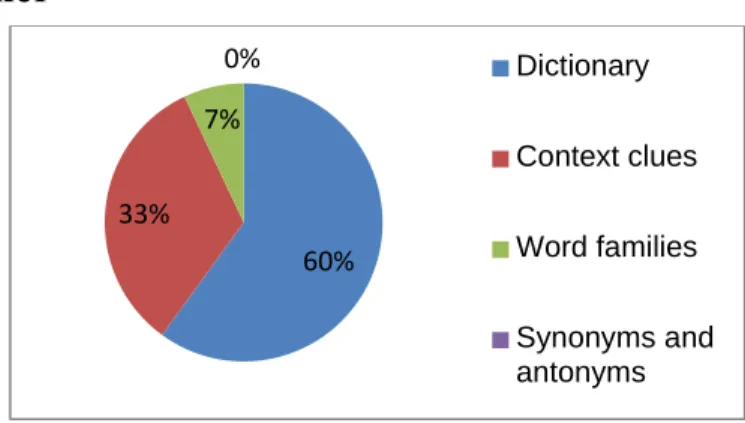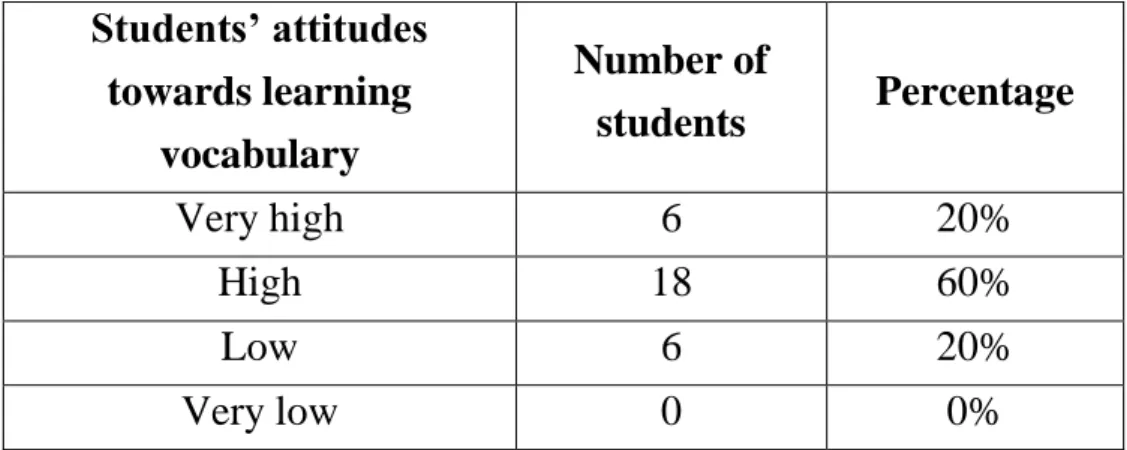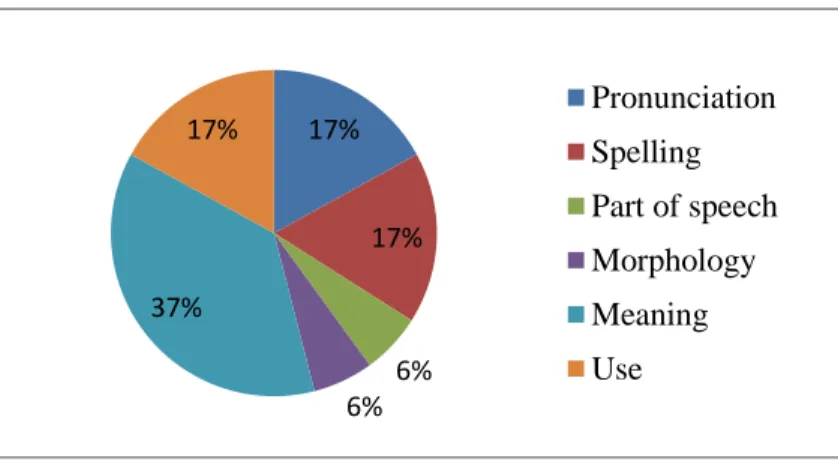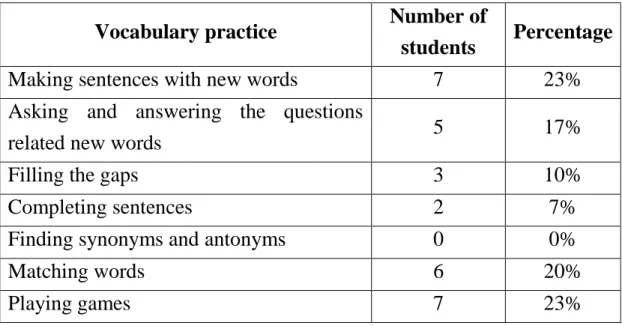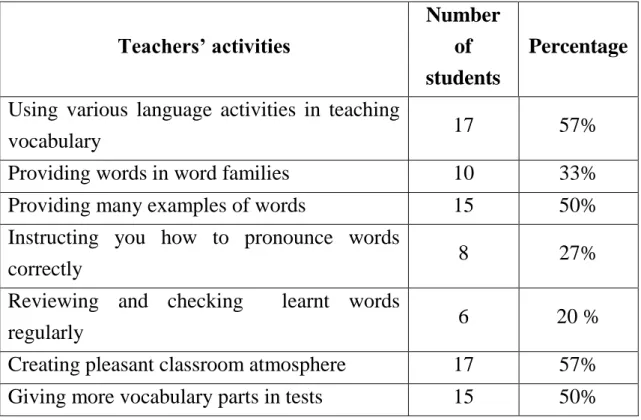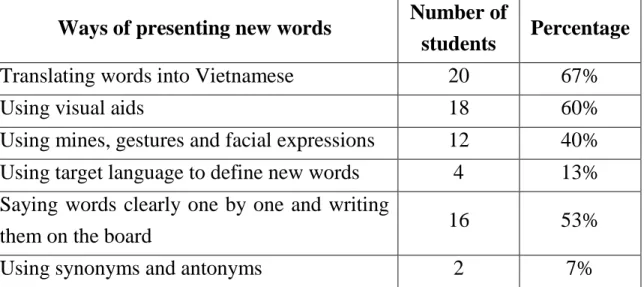Nội dung và yêu cầu phải đáp ứng khi làm nhiệm vụ tốt nghiệp (lý thuyết, thực hành, số liệu cần tính toán và hình vẽ). Tâm lý và thái độ của sinh viên trong quá trình tốt nghiệp.
INTRODUCTION
- Rationale
- Aims of the study
- Research Questions
- Scope of the study
- Research methodology
- Significance of the study
- Organization of the study
By seeking answers to the research questions, the questionnaire survey is chosen to obtain relevant information about the study. The result of the study will help second-year non-English majors to minimize their demotivation in learning English vocabulary.
LITERATURE REVIEW
Theoretical backgrounds of motivation
- The definition of motivation
- Types of motivation
- The importance of motivation in second language learning
- Motivational factors in second language learning
These researchers also stated that the success of second language learners can be greatly influenced by their personalities. However, researchers have so far agreed that learners with a positive attitude towards the subject and high motivation are likely to be successful in second language learning (Gardner: 1985).
Theoretical background of vocabulary
- The definition of vocabulary
- Types of vocabulary
- What are involved in knowing a word
- Explicit vocabulary learning and implicit vocabulary learning
- Potential difficulties in learning vocabulary
This means that in order to use productive vocabulary, the students are supposed to know how to pronounce it well, they need to know and be able to use the grammar of the target language, it is also hoped to be familiar with collocation and the connotative meaning of the words. Passive vocabulary or comprehension consists of the words that people understand when they read and listen. According to Nation (1990) and Taylor (1990), knowing a word involves not knowing the spelling, morphology, pronunciation, meaning, or the equivalent of the word in the learner's mother tongue, but also the collocations, register, polysemy and even its homonym.
They need to know the grammatical function, the unpredictable change of form in certain contexts or some idiosyncratic ways of connecting to other words in sentences, the regularity and irregularity, the singular and plural forms of the new words. A less obvious part of a word's meaning is its connotation in different contexts or its connotative meaning. Therefore, the “watch and remember” way of learning vocabulary does not seem very effective for English language learners.
Correct pronunciation of a word also requires stress on the right syllable, which causes problems for learners of English because the position of stress in English words is variable and must be learned as part of the spoken form of the word. They do not help students specify the International Phonetic Alphabet or instruct them how to consult the dictionary for the phonetic transcription of the words so that students can learn it on their own. The Challenging Curriculum: The curriculum requirements are relatively challenging for low and intermediate level students.
Factors affecting vocabulary learning
- Learner-related factors
- Teacher-related factors
- Environmental factors
- Intralexical factors
Poor implementation of teaching aids and reference materials: Classroom equipment is relatively simple and traditional, such as blackboard, chalk. In addition, poor utilization of equipment in laboratory rooms, lack of English reference materials also make it difficult for teachers to organize interesting vocabulary lessons. Personality: According to Reza (2005), personality is one of the individual differences which are widely established to have an effect on learning in general and second language acquisition in particular.
Macintyre (1999) and Young (1999) point out that student anxiety was created by a tense classroom climate - one of the factors that undermines learning effectiveness and second motivation (cited in Dornyei, 2001). According to Laufer (1997), intralexical factors that influence vocabulary learning motivation include phonological factors, grammatical features of the word and semantic features of the word. In addition, word length can be seen as one of the indices of learning load (Bernhardt, 1984, Nation & Coady, 1989).
Word categories: It is sometimes argued that some grammatical word categories are more difficult to learn than others. Idioms are difficult to understand as each word gives little or no clue to the meaning of the idiom. Multiple Meaning: Lyons asserts that "the ideal speakable language would be one in which each form had only one meaning and each meaning was associated with only one form".
METHODOLOGY
- Sample and sampling
- Instruments
- Data collection
- Data analysis
The table shows the different opinions of the students about the motivation factor as personality to motivate students to learn a word. One third of the students used context clues to learn while the rest liked to use word families. 83% of the students chose little or even no effects of age of acquisition on learning English words.
20% of students had the opposite opinion when they had a low attitude towards learning English vocabulary. Nearly 73% of students said that enthusiastic teachers motivated them most when learning English vocabulary. The majority of students (23%) enjoyed making sentences with new words and playing games.
50% of students liked being given examples of words and parts of vocabulary in the tests. The least number of students (7%) liked using antonyms and synonyms to learn. After analyzing the data, it was found that all the motivational factors studied have different effects on students' motivation to learn English words.
DATA ANALYSIS, FINDINGS, AND SUGGESTED
Data analysis
- Demographic information
- Motivational factors affecting second – year non English majors in
- Learners’ factors
- Teachers’ factors
- Environmental factors
- Language factors
They started learning English at different ages depending on the syllabus of the schools where they studied. The questionnaire also elicited the subjects' own perception of the importance of vocabulary and the difficulty of learning it. Moreover, while learning vocabulary, most of the students encountered some basic problems related to reading a word, recognition, writing, remembering its meaning or use.
60% of students enjoyed being able to recognize the pronunciation of the word, 67% of students are motivated by using the word. The highest number of students (40%) considered responsiveness as the most important factor, while the lowest were inhibition and empathy (0%). There were 6 students (20%) who claimed that self-esteem was a motive and it was. the number of students who thought about talkativeness. As shown in Table 5, students were still interested in the teachers' teaching methods.
One of the factors that has a significant influence on creating positive motivation in learning vocabulary is the environmental factor. Word's part of speech and morphology got the least interest from the students with about 6%. Moreover, the result shows that the majority of students (67%) liked vocabulary tasks, while the rest did not like them.
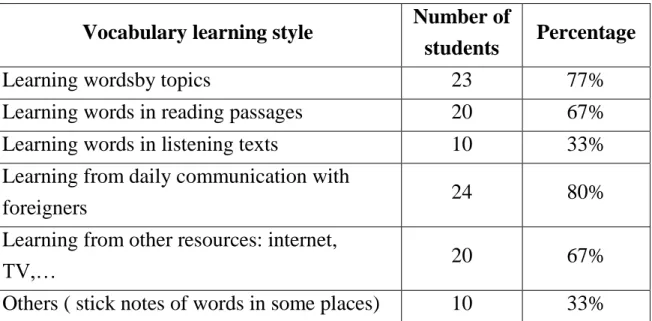
Findings
Based on the above table, it is clearly seen that the interest in the activities applied by the teachers to improve the motivation to learn English is different among the students. There were 17 students who wanted their teachers to use a variety of language activities in teaching vocabulary. The table presents new ways of presenting words that make students more motivated in learning English vocabulary.
60% (18 students) preferred using visual aids when learning, compared to 40% (12 students) who preferred using mines, gestures and facial expressions. Meanwhile, 13% of students believed that learning vocabulary from the target language was a motivating way to acquire and improve language skills. First, among the most important factors, learner factors have the most influence, while intralexical factors have the least influence.
With this factor, students like to learn using vocabulary more than other learning methods. Students who learn in a classroom with a comfortable classroom atmosphere, with suitable facilities and amenities, they will definitely increase their motivation. In these factors, students encounter many language problems that come from the English words themselves such as pronunciation, spelling, form, meaning or usage.
Suggested solutions
It is necessary for students to identify their difficulties in learning new words and try to gain motivation in various ways to overcome them. It is important that students try to change the less effective traditional way of learning words, such as always the use of bilingual dictionaries, and find the most suitable way of learning: learning by topic, in word families, notes, games, etc. It is highly recommended that students actively participate in all activities taught by teachers in the classroom and change their self-study habits appropriately.
Students do not forget to do all homework provided and review new words regularly before vocabulary lessons. According to the results of the study, students often have word problems such as incorrect pronunciation, abuse, or inability to remember words, etc. It is advisable that the lectures alternate new word learning activities in the classroom and divide students into pairs or groups to teach vocabulary.
There are more interesting, flexible and appropriate vocabulary teaching methods for each subject to maintain interest and motivation for students. Different ways are used to present new words such as visual aids, gestures, facial expressions, etc. to improve students' motivation because HPU sophomores are visual, audio and kinesthetic learners. It is necessary to consider all difficulties encountered by students, their personality and preferred leaning styles in order to design suitable vocabulary tasks.
CONCLUSION
- Summary of major findings
- Suggestions for further study
Bạn gặp phải vấn đề nào sau đây khi học từ vựng? bạn có thể có nhiều lựa chọn). Điều nào sau đây khiến bạn có động lực học từ mới? bạn có thể có nhiều lựa chọn). Phong cách học từ vựng ưa thích của bạn là gì? bạn có thể có nhiều lựa chọn).
Học từ theo chủ đề Học từ từ bài học đọc Học từ từ bài học nghe. Học từ trong giao tiếp hàng ngày với người lạ Học từ từ các nguồn khác: internet, TV, v.v. Phương pháp nào hiệu quả nhất trong việc giúp bạn có thêm vốn từ vựng?
Tuổi tác của bạn ảnh hưởng như thế nào đến động lực học từ vựng của bạn Yếu tố nào của giáo viên khiến bạn có động lực học từ vựng? bạn có thể có nhiều lựa chọn). Những yếu tố môi trường nào ảnh hưởng tích cực đến động lực học từ vựng của bạn?
